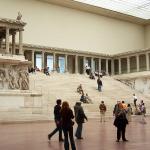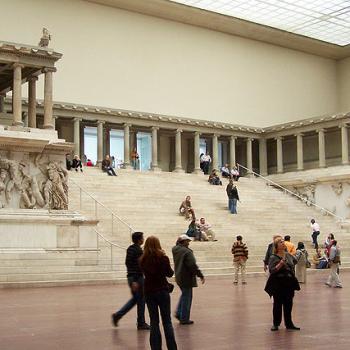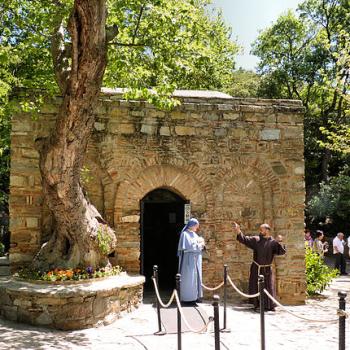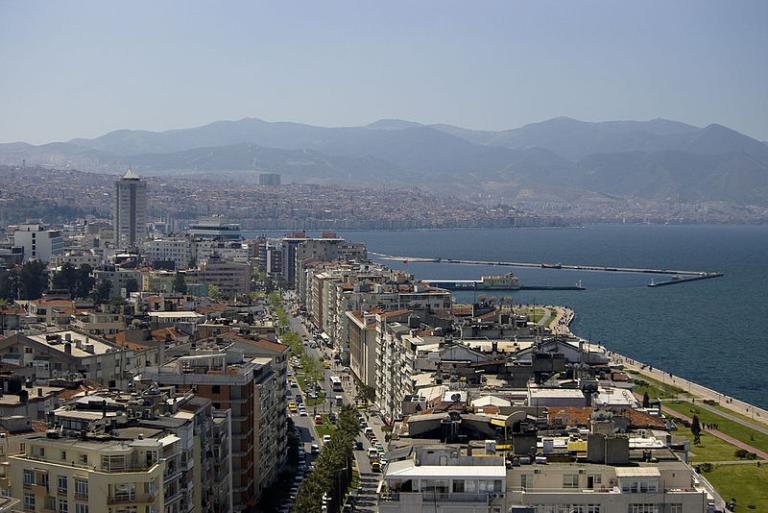
Newly posted for your enjoyment on the website of the Interpreter Foundation: Conference Talks: Cherubim and Seraphim: Iconography in the First Jerusalem Temple, presented by John Gee
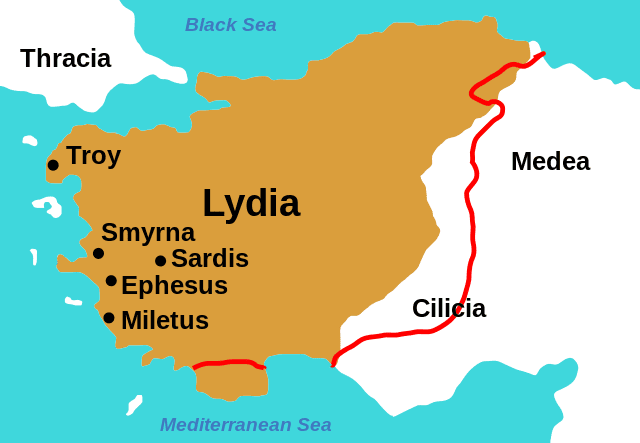
Our first stop this morning was at Colossae, which is, now, little more than a tumulus or a tell that awaits excavation. And this morning it was a muddy one. (See “John and Paul, but no George or Ringo.”)
We next visited Alaşehir, the town known anciently (and, in fact, until it was conquered by the Ottomans in AD 1390) as Philadelphia (Φιλαδέλφεια, i.e., “[the city of him who] loves his brother”). Alaşehir was, in fact, perhaps one of the first ancient cities with the name Philadelphia. It was established in 189 BC by King Eumenes II of Pergamon (reigned 197–160 BC). Eumenes II named the city for the love of his brother, who would eventually succeed him as Attalus II (159–138 BC), whose loyalty had earned him the nickname Philadelphos, which literally means “[one who] loves his brother.”
Lacking an heir when he died in 133 BC, the last of the Attalid kings of Pergamon, Attalus III Philometer (“loves his mother”; I swear that I’m not making this up), bequeathed his kingdom, including Philadelphia, to his Roman allies. Thereupon, in 129 BC, Rome established the province of Asia or Asia Minor by combining Ionia and the former Kingdom of Pergamon.
Within today’s Türkiye, the city of Alaşehir is famed for its dried Sultana raisins, although cultivation for the less labor-intensive fresh fruit market has grown in recent decades. Philadelphia is probably best known as one of the seven churches of Asia in the book of Revelation. At Revelation 3:7-13, the church members here were challenged to “hold fast” and to look forward to the coming of the “new Jerusalem.” The city’s history of earthquakes may lie behind the reference to making her church “a pillar in the temple” (Revelation 3:12). Philadelphia shares the distinction with Smyrna of receiving nothing but praise from the angel, or from Christ, in the Revelation of John.
In the afternoon we visited the ruins of the ancient city of Sardis, the ancient capital of the Lydian Empire and another of the seven cities of Revelation. This is the city that was berated by John for its façade of strength when, in reality, it was weak (Revelation 3:1-6).
Sardis boasts a spectacular ancient synagogue, directly adjacent to a spectacular gymnasium – an ironic and rather unexpected pairing, given the clash of synagogue and gymnasium in Judea – as well as an impressive albeit unfinishedd temple of Artemis in a beautiful nearby valley.
It also has an interesting secular history. I’ll start with a king by the name of Gyges, who lived during the first half of the seventh century BC. The main source for his life is the great historian Herodotus, according to whom he was bodyguard of the previous Lydian king, Candaules, of the Heraclid dynasty, who believed his wife to be the most beautiful woman in the world. In order to prove his point, he arranged that Gyges secretly see his wife naked as she disrobed for bed. But she soon discovered what had happened, and she was so enraged by the betrayal that she confronted Gyges with the choice of either murdering her husband and making himself king or being himself put to death.
The last of the Lydian kings was Croesus, who reigned from 585 BC until he was defeated by the Persian king Cyrus the Great in either 547 BC or 546 BC. Croesus is still famous for his enormous wealth. The saying “As rich as Croesus” is still current; in The Simpsons, Montgomery Burns lives at the corner of Croesus and Mammon Streets.
Croesus is said to have gone to the oracle of Apollo at Delphi, wondering whether he should attack the Achaemenid Empire of the Persian king Cyrus. The oracle responded that, if he went to war against the Persians, he would destroy a great empire. So he did, and he did: The empire that he destroyed was his own. Immediately after his defeat, so the story goes, he was about to commit suicide and Cyrus plucked him from the flames. Or, alternatively, Cyrus was going to burn him alive, but Croesus prayed to Apollo and a sudden storm extinguished the fire, leading Cyrus to spare him. Thereafter, as the two stood watching the Persian troops loot and pillage Sardis, Croesus pointed out to the Persian king that, since the city was no longer his but now belonged to Cyrus, they were looting and pillaging Cyrus’s wealth. Whereupon Cyrus put an end to the pillaging.
One historical fact that seems fairly solid: The first minted coinage in the world appears to have been created under King Croesus.
Lastly, we visited the rather limited remains of the city of Thyatira (or Thyateira;Θυάτειρα), another of the seven cities of Revelation, which was famous for its dyeing facilities and which was a center of the purple cloth trade. Most of Thyatira is now buried under the modern Turkish city of Akhisar (“White Castle”)
During one of our longer drives today, I read and briefly commented upon one of the many Western literary responses to the culture and history of the places we’ve been visiting:
“Sailing to Byzantium,” by William Butler Yeats
IThat is no country for old men. The youngIn one another’s arms, birds in the trees,—Those dying generations—at their song,The salmon-falls, the mackerel-crowded seas,Fish, flesh, or fowl, commend all summer longWhatever is begotten, born, and dies.Caught in that sensual music all neglectMonuments of unageing intellect.IIAn aged man is but a paltry thing,A tattered coat upon a stick, unlessSoul clap its hands and sing, and louder singFor every tatter in its mortal dress,Nor is there singing school but studyingMonuments of its own magnificence;And therefore I have sailed the seas and comeTo the holy city of Byzantium.IIIO sages standing in God’s holy fireAs in the gold mosaic of a wall,Come from the holy fire, perne in a gyre,And be the singing-masters of my soul.Consume my heart away; sick with desireAnd fastened to a dying animalIt knows not what it is; and gather meInto the artifice of eternity.IVOnce out of nature I shall never takeMy bodily form from any natural thing,But such a form as Grecian goldsmiths makeOf hammered gold and gold enamellingTo keep a drowsy Emperor awake;Or set upon a golden bough to singTo lords and ladies of ByzantiumOf what is past, or passing, or to come.
Tonight, we’re staying in İzmir, the ancient Smyrna.
Posted from İzmir, Türkiye



